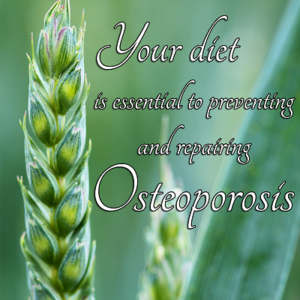 Osteoporosis has been nicknamed “the silent thief”. Bone loss occurs incrementally without our being aware of it. Osteoporosis often presents without symptoms and can happen to anyone, although older women are statistically over-represented.
Osteoporosis has been nicknamed “the silent thief”. Bone loss occurs incrementally without our being aware of it. Osteoporosis often presents without symptoms and can happen to anyone, although older women are statistically over-represented.
Osteoporosis seems like a new “disease”, but there is little doubt it has always existed in humankind. Due to improved diagnostic capabilities and understanding of the processes involved in bone degeneration and regeneration, there is a seeming explosion in the rates of detection of the condition.
While our “sit-down” lifestyle may be a contributing factor, there is no doubt that diet is a huge factor in bone and skeletal health. There are also other preventative measures, such as getting adequate exercise and sunlight.
Diet is, however, almost always the single aspect of our lives that we can most influence and take responsibility for. There is increasing recognition that if we do not pay attention to our diet during our younger years, we may be more susceptible to the effects of osteoporosis in our later years.
Undoubtedly, following a diet for osteoporosis prevention is a smart move. This does not mean looking for a great or wonderful ‘osteoporosis diet’, however there are a variety of foods we can incorporate into our diets that can help prevent osteoporosis from happening, or at the very least, reducing its impact.
On the flip side, there are foods to avoid since these may interfere with absorption levels of important vitamins and minerals, or even cause them to be expelled from the body.
Foods to Eat
Calcium and magnesium are the two big ‘macro’ nutrients required to build healthy bone and maintain bone density.
Calcium Rich Foods
Conventional recommended dietary sources of calcium have had a great focus on dairy products, because they contain large amounts of calcium. However, recent research makes strong claims that the calcium obtained from vegetable sources such as leafy green vegetables is more effectively absorbed and utilized than that from dairy sources.
Calcium rich foods such as yogurt, milk and cheese are great dairy choices.
Excellent non-dairy food sources include: lettuce, green tea, green peas, parsley and oats and lemons.
Lemons additionally contain trace minerals which are also essential for maintaining bone health.They are also high in Vitamin C, which increases overall calcium absorption.
Sweet potatoes, Atlantic sardines, pumpkins and pink salmon are other positive choices.
Magnesium Rich Foods
In order for your body to utilize the calcium you also need magnesium. In the past, dietary recommendations for osteoporosis prevention focused almost solely on calcium. Current research recognizes that intake of calcium is quite often adequate, but that calcium is not being properly utilized due to a lack of necessary complementary minerals and vitamins.
The biggest limiting nutrient is often magnesium, as it far more common to be deficient in magnesium than calcium. Magnesium rich foods include leafy green vegetables, brazil nuts, almonds and other delicious nuts and seeds, avocados, bananas and beans and lentils.
There are of course other foods rich in calcium and/or magnesium, so you are not limited to those mentioned above.
What Should You Avoid
Anyone with an interest in preventing or overcoming osteoporosis needs to be aware that consuming salt, soft drinks, caffeine and alcohol in excess is detrimental to bone health.
A high sodium diet can trigger the kidneys to excrete calcium before it can be utilized by the body. Caffeine too can cause the body to expel calcium. Tea contains caffeine in much smaller amounts, so switch to drinking tea if possible.
Prevention is Always Better than Curing
Following a healthy diet for osteoporosis prevention is probably the most effective action you can personally take to prevent this condition from impacting your future life. Certainly, there are other factors, but a healthy lifestyle is the best medicine in preventing bone loss. It is also the area over which you have the most control.






